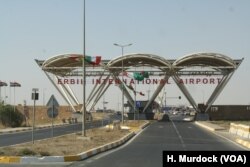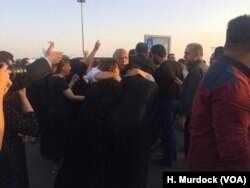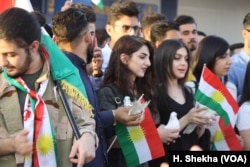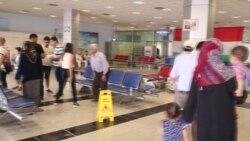As the last international flights to and from the Kurdistan Region in Iraq were grounded Friday, hundreds of protesters wielding colorful balloons and signs with messages like "compassion" and "love" gathered outside the airport.
Protesters say they are hoping Baghdad backs down on its decision to establish a no-fly zone over their region after a controversial independence vote passed by more than 92 percent.
"This doesn't just impact Kurdistan," said the protest's organizer, Rowand Hussien. "It impacts refugees, displaced families and all the forces fighting [Islamic State militants]."
The Iraqi government has called the referendum illegal, and has vowed to force the Kurdistan Region to remain united with the rest of the country. In recent days, Iraqi Prime Minister Haider al-Abadi has received calls from leaders in France, Britain, Iran and Turkey expressing their support for Iraqi unity, according to his Twitter account.
"We will not compromise on Iraq's unity or sovereignty. Iraq is strong. Some wanted to weaken it. They have miscalculated," Abadi tweeted the day after the ballot.
Besides canceling international flights, Baghdad has ordered the Kurdistan Region to hand over land borders and oil revenues to federal authorities. In response, the Kurdish leadership has been defiant, calling for talks to negotiate the Kurdistan Region's transition into an independent country.
At the protest, students gathered quietly, saying they support their leaders' calls for dialogue but worry about the economic impact of isolation.
"This will impact Kurdish people," said Amir, a 24-year-old business administration graduate. "But to create a new country, we will have to be patient and suffer a little."
A new life
A few meters away from the protest, another crowd gathered dressed in gray, brown and black. They were waiting for the bodies of their loved ones to arrive on the last flights in from Turkey.
The body of Bangin Pirot, a journalist in his 30s, was among the dead. He died on a boat carrying more than 80 passengers attempting to get to Europe to apply for asylum. Pirot had a paralyzed leg, and he was seeking medical care.
"They just wanted a better life," said Sarkar, his cousin, as they waited.
The young people protesting nearby said their dreams were not so different from those of the returning dead.
Kurdistan is a region that shares a culture, language and history but it overlaps the borders of Iraq, Iran, Turkey and Syria. The referendum for independence was exclusively for Iraqi Kurdistan, already a semi-autonomous region.
Countries around the world objected to the referendum, especially Turkey, which faces an armed insurgency from Kurdish separatists at home. Turkey has threatened oil sanctions on the Kurdish Region, a move that could cripple its economy.
Other world powers, including the United States, have said the Kurdish independence movement in Iraq could destabilize the region and negatively impact the war with Islamic State militants.
But for the students at the airport, the century-old dream of Kurdish independence is more important than the potentially devastating consequences.
"We do not deserve this kind of ban," said Vian, 21, "We deserve a country. We deserve a home."
WATCH: Scenes from inside Irbil International Airport











